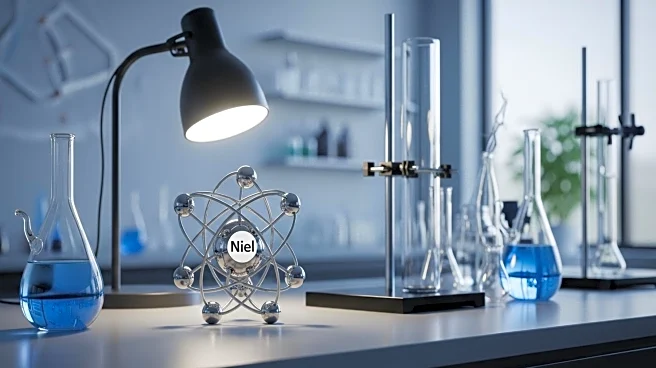What is the story about?
What's Happening?
Northwestern University chemists have introduced a groundbreaking plastic upcycling process that could significantly streamline the recycling of mixed plastic waste. The process utilizes a new, cost-effective nickel-based catalyst that selectively breaks down polyolefin plastics, which include polyethylenes and polypropylenes. These plastics account for nearly two-thirds of global plastic consumption and are typically single-use items. The catalyst transforms these low-value solid plastics into liquid oils and waxes, which can be upcycled into higher-value products such as lubricants, fuels, and candles. This innovation could eliminate the need for labor-intensive sorting of plastic waste by type, making recycling more efficient and economically viable. The study detailing this process was published in the journal Nature Chemistry.
Why It's Important?
The development of this nickel-based catalyst addresses a major challenge in plastic recycling: the need for meticulous sorting of plastic waste. Polyolefins, which are the most used plastics globally, have a recycling rate of less than 10% due to their sturdy composition and strong carbon-carbon bonds. The new catalyst offers a solution by breaking down these bonds efficiently, even in the presence of contaminants like PVC, which typically render plastics unrecyclable. This advancement could significantly increase recycling rates, reduce environmental pollution, and transform the economic landscape of the recycling industry by enabling the conversion of waste into valuable products.
What's Next?
The next steps involve scaling up the use of this catalyst for industrial applications, potentially revolutionizing the recycling industry. Stakeholders such as recycling companies and environmental agencies may explore partnerships to implement this technology on a larger scale. Further research could focus on optimizing the catalyst's performance and exploring its application to other types of plastics. The successful integration of this process could lead to policy changes and incentives to promote widespread adoption, ultimately contributing to a more sustainable approach to plastic waste management.
Beyond the Headlines
This development could have profound implications for environmental sustainability and public health. By reducing the amount of plastic waste in landfills and the environment, the catalyst could help mitigate the long-term effects of microplastic pollution. Additionally, the ability to recycle contaminated plastics could lead to more comprehensive waste management strategies, encouraging industries to adopt greener practices. The ethical dimension of reducing plastic pollution aligns with global efforts to combat climate change and protect ecosystems.

















